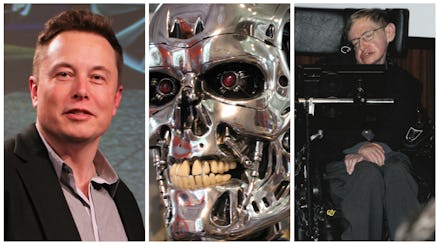The Biggest Geniuses in Tech Are Warning Us All About Killer Robots. We Should Listen

Some of the world's marquee visionaries, entrepreneurs and researchers — Elon Musk, Stephen Hawking, Steve Wozniak and Noam Chomsky included — joined together yesterday and signed an open letter warning of a possible artificial intelligence "arms race," saying that without proper care and regulation, it will "only be a matter of time until [AI weapons and robots] appear on the black market and in the hands of terrorists" and other sinister players on the world stage.
"You know those stories where there's the guy with the pentagram and the holy water, and he's sure he can control the demon? Doesn't work out."
A volunteer group called the Future of Life Institute released the letter along with robust research recommendations. The Institute admits that artificial intelligence is coming and research is ramping up. We just need to protect ourselves, the scientists say, from everything going terribly wrong.
Musk stands out from the list not just because of his recent adventures with Tesla Motors and SpaceX, but because the renowned innovator is almost comically afraid of artificial intelligence. He's called unfriendly artificial intelligence our "biggest existential threat" and has compared AI research to demon summoning.
"You know those stories where there's the guy with the pentagram and the holy water, and he's sure he can control the demon?" Musk said at an MIT symposium in October. "Doesn't work out."
Some of the top research in AI and robotics is coming from the military, for obvious reasons. But as the letter says, the implicit goals of the scientific community doesn't match the objectives of the people who want to exploit their work to make weapons of war:
Just as most chemists and biologists have no interest in building chemical or biological weapons, most AI researchers have no interest in building AI weapons — and do not want others to tarnish their field by doing so, potentially creating a major public backlash against AI that curtails its future societal benefits. Indeed, chemists and biologists have broadly supported international agreements that have successfully prohibited chemical and biological weapons, just as most physicists supported the treaties banning space-based nuclear weapons and blinding laser weapons.
Unfortunately, if there are going to be significant strides in robotics and artificial intelligence, they could very likely come out of a government project. All around the country, U.S. Defense Advanced Research Projects Agency has been pouring millions of dollars into robotics, from national defense weaponry development to college robotics competitions. That particular branch of the government has a pretty good history of tech innovation.
To be clear: There is no widespread crisis of autonomous robots flying around killing everyone. But for scientists who don't hold the reins over lawmakers and admirals, the best hope they have is to inform the public — to outrage, provoke and even scare. Whatever it takes to impress upon us all the real danger we face.
"We're responsible for so many things in this world, but there are points at which you have to take initiative," futurist luminary and author Wendell Wallach told Mic earlier this month about facing up to futuristic threats. "We're not all going to, but informed citizens pressure us to take action before a real crisis."
Anyone can sign the letter — and according to the lengthy list of names on its signatories page, which we put into an Excel sheet to count, at least 6,980 people have.